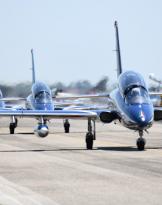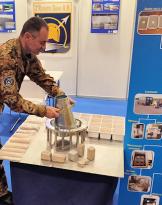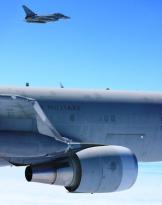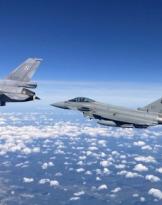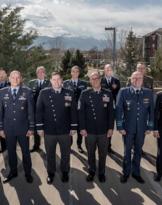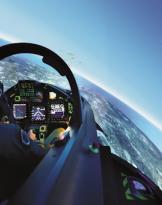Three months of activity, over 720 million data analyzed as part of a simulation scenario in which over one hundred specialized operators, both military and civilian, worked in close synergy to face the main evolutionary challenges of the IT world and evaluate the use of innovative technologies for the cyber domain. These are the numbers of the "Cyber Eagle 2023", exercise by cyber security planned and conducted by the Air Force - through the logistics command of the armed force - in partnership with DEAS (Defense and Analysis Systems), a leading Italian company in the security of networks, information systems and IT services in the country, which officially ended Today.
The results of the exercise, which has now become a model of public-private partnership between an armed force and an Italian company and technologies, were illustrated this morning at the automated information systems department (Re.SIA) of the Air Force, who oversaw the design phase, in the presence of the Chief of Staff of the Air Force, Air Force General Luca Goretti, institutional authorities and representatives of companies in the sector.
The exercise - now in its eighth edition - had the objective of increasing awareness of the cyber threat and testing the reaction capacity of the armed force in assessing the threat itself and the subsequent actions to be taken, with the involvement of the command and control systems management and innovation department (Re.GISCC) for the phases of conducting the exercise activities and the general safety department of the Air Force General Staff for the security aspects related to the IT incident on AM networks.
 “We must be able to transfer this type of collaboration with the academic world and with sector companies into our particular sphere in order to be ready to manage and, where possible, anticipate change and possible resulting threats”, declared General Goretti in his speech. “I believe that the results achieved during the exercise can constitute an information asset to be shared in the Defense sector and constitute a reference in the technological field. Cooperation in the field of cybersecurity and cyber defense, in this sense, is something that can materialize not only at the national level, but also by offering our contribution to international collaboration with NATO allies, countries and institutions of the European Union and other friendly countries."
“We must be able to transfer this type of collaboration with the academic world and with sector companies into our particular sphere in order to be ready to manage and, where possible, anticipate change and possible resulting threats”, declared General Goretti in his speech. “I believe that the results achieved during the exercise can constitute an information asset to be shared in the Defense sector and constitute a reference in the technological field. Cooperation in the field of cybersecurity and cyber defense, in this sense, is something that can materialize not only at the national level, but also by offering our contribution to international collaboration with NATO allies, countries and institutions of the European Union and other friendly countries."
“In an era in which cybersecurity takes on ever greater geopolitical and geostrategic relevance, our partnership with Aeronautica Militare is strategic”, underlined Dr. Stefania Ranzato, sole director of DEAS Spa. “The Armed Force has been a pioneer in fully exploiting the combination of disruptive technologies associated with entirely Italian companies to improve its resilience towards present and future cyber threats”.
Starting from the creation of optimized software aimed at orienting and facilitating the work of operators, in technical jargon of "cyber agents", and thanks to the use of Artificial Intelligence (AI) models and the use of the powerful HPC supercomputer - High performance computer of Re.SIA, which reduced the necessary data processing time by more than 14 times with standard calculation tools, specialized personnel from the armed force and a team of researchers and experts from the DEAS company, who also covered the role of potential external attackers , worked closely for almost three months on a highly realistic scenario, also designed in light of the current international geopolitical context. Communications and data exchanges of the aircraft's ground-to-ground radio assistance and ground-to-ground radio systems were replicated, also taking advantage of the ability to video processing capability of remotely piloted systems Predator and other aerial command and control platforms supplied to the Armed Forces.
 Through the production of specific information dashboards dedicated to cyber operators and analysts, capable of immediately associating the threat with one or more operational capabilities potentially degraded by cyberattacks, the exercise made it possible to increase the reaction capacity of the armed force in assessment of the threat and subsequent actions to be taken and evaluating innovative technologies for the cyber domain. Furthermore, with the involvement of specialized personnel from experimental flight department of the Air Force, in an exercise environment a cybernetic attack on an avionics system of a military aircraft was simulated for the first time, generating and installing a malicious modification on a sophisticated system used on the aircraft Tornado for the collection and analysis of mission data. An activity that has demonstrated the importance of guaranteeing an appropriate cyber security framework to protect aircraft assets, thus expanding the range of possible inconveniences or errors that can be investigated in the flight test phases to include potential cyber threats. .
Through the production of specific information dashboards dedicated to cyber operators and analysts, capable of immediately associating the threat with one or more operational capabilities potentially degraded by cyberattacks, the exercise made it possible to increase the reaction capacity of the armed force in assessment of the threat and subsequent actions to be taken and evaluating innovative technologies for the cyber domain. Furthermore, with the involvement of specialized personnel from experimental flight department of the Air Force, in an exercise environment a cybernetic attack on an avionics system of a military aircraft was simulated for the first time, generating and installing a malicious modification on a sophisticated system used on the aircraft Tornado for the collection and analysis of mission data. An activity that has demonstrated the importance of guaranteeing an appropriate cyber security framework to protect aircraft assets, thus expanding the range of possible inconveniences or errors that can be investigated in the flight test phases to include potential cyber threats. .
Il automated information systems department (Re.SIA) of the Air Force has recently concluded, among other things, the audit process as part of a specific call for tenders from the national cybersecurity agency, receiving the ISO27001:2017 certification on the management system for information security, first among the armed forces to achieve all the necessary requirements as part of the certification process desired by the Defense General Staff.




